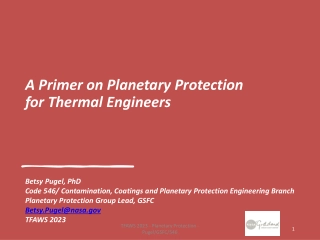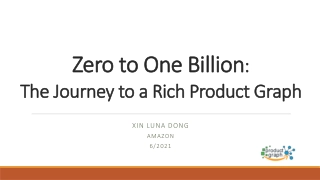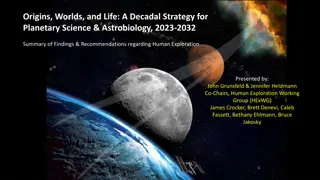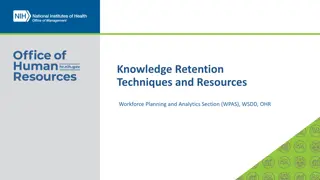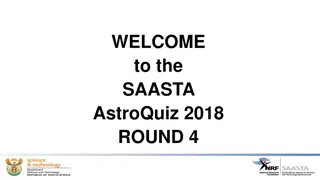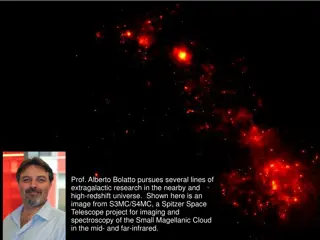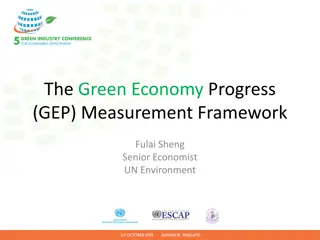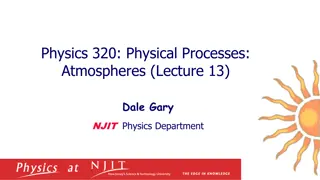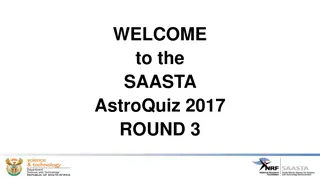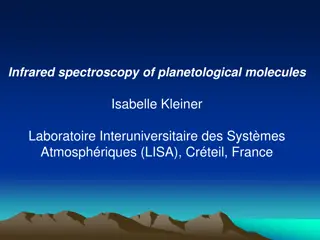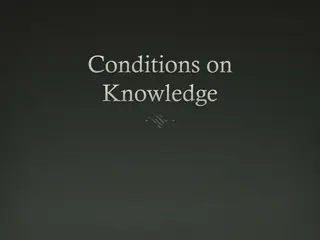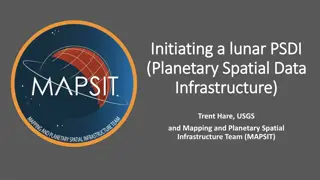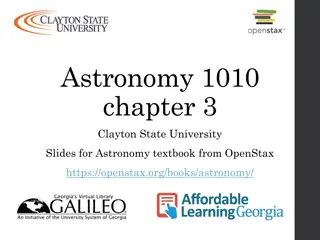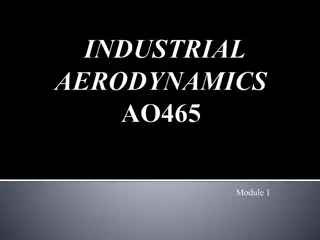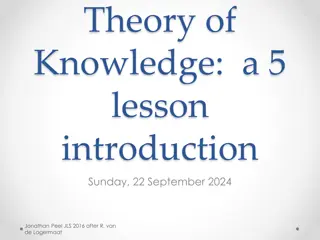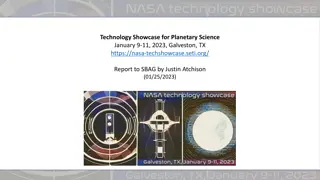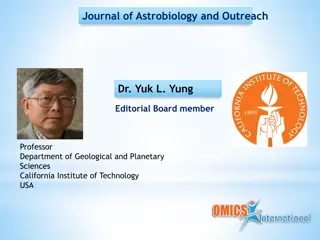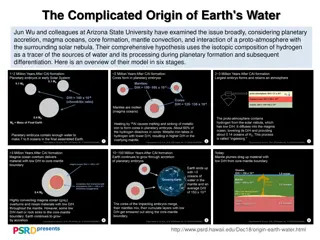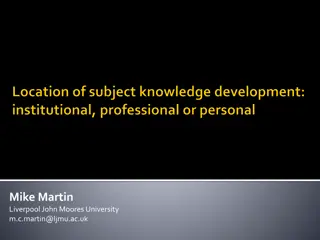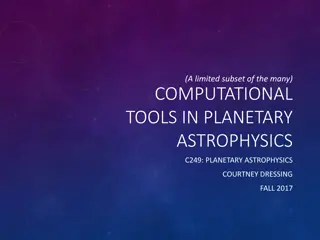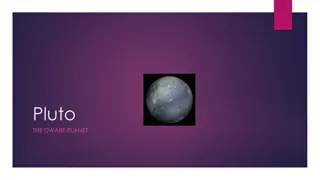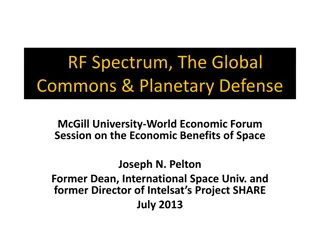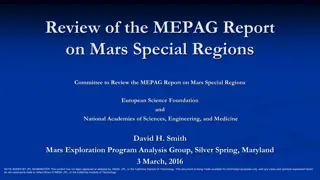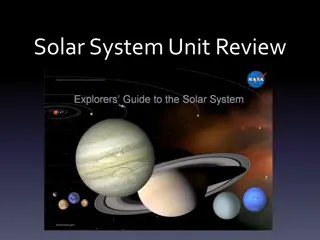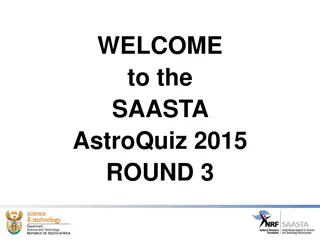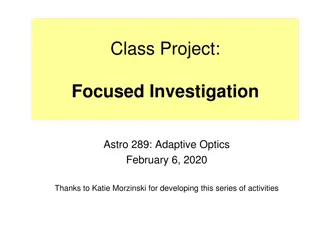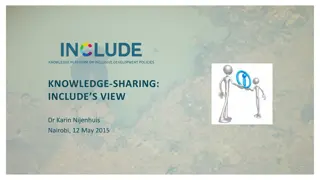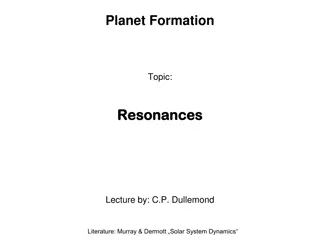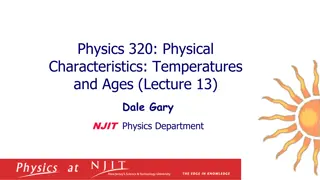❤[PDF]⚡ Planetary Ring Systems (Springer Praxis Books)
\"COPY LINK HERE ; https:\/\/getpdf.readbooks.link\/B001941UHI\n\n[PDF READ ONLINE] Planetary Ring Systems (Springer Praxis Books) | Planetary Ring Systems (Springer Praxis Books)\n\"\n
0 views • 6 slides
A Primer on Planetary Protection for Thermal Engineers
Delve into the realm of planetary protection with this comprehensive primer tailored for thermal engineers by Betsy Pugel, PhD. Explore the intersection of thermal and planetary protection, flight project practicalities, and the crucial components of forward and backward contamination. Gain insights
1 views • 48 slides
Knowledge Capture
Knowledge capture is crucial for organizations to retain valuable expertise and prevent loss of critical knowledge due to employee turnover. Tacit and explicit knowledge play key roles, requiring strategic planning for retention, incentivizing knowledge-sharing culture, and implementing effective st
0 views • 6 slides
Exploring Product and Knowledge Graphs for Enhanced Information Retrieval
Dive into the world of product and knowledge graphs, uncovering the journey to a rich product graph, examples of knowledge graphs for songs, and the mission to provide comprehensive information on products and related knowledge. Discover use cases ranging from information provision to enhancing sear
3 views • 76 slides
Understanding Knowledge Management: Processes and Frameworks 2. In knowledge management, organizations create, share, and manage knowledge to enhance performance. It involves acquiring different types of knowledge through various means, such as perc
Knowledge Management, Organizational Objectives, Types of Knowledge, Tacit Knowledge, Explicit Knowledge
1 views • 17 slides
Exploration Strategy for Planetary Science & Astrobiology 2023-2032
The decadal strategy outlines a comprehensive plan for planetary science and astrobiology, emphasizing the integration of human exploration activities with scientific objectives. Key elements include leveraging planned human space missions for new scientific opportunities and identifying areas of pl
9 views • 10 slides
Effective Knowledge Retention Strategies in Workforce Planning and Analytics
Retaining knowledge is crucial for organizations to enhance customer service, foster innovation, improve efficiency, and bridge skill gaps. This article explores the significance of knowledge retention, the types of knowledge essential for succession planning, and two effective strategies - the Know
1 views • 10 slides
SAASTA AstroQuiz 2018 Round 4 - Test Your Astrophysics Knowledge!
Challenge your knowledge of astronomy with these 10 questions from the SAASTA AstroQuiz 2018 Round 4. Test your understanding of telescopes, galaxies, planets, and more in this exciting quiz. Answer questions on various aspects of astronomy, from telescope construction in South Africa to planetary r
0 views • 44 slides
Addressing Controversial Topics in Planetary Science
Explore the challenges of addressing controversial topics in planetary science during public engagement, including misunderstandings about science and the nature of scientific inquiry. Discover solutions and engage in activities to enhance public understanding.
0 views • 15 slides
Fascinating Research in Astrophysics and Planetary Science
Prof. Alberto Bolatto explores extragalactic research, Prof. Drake Deming studies extrasolar planets, Dr. Tony Farnham specializes in cometary studies, Lori Feaga maps cometary gas comae, Prof. Suvi Gezari investigates supermassive black holes, and Prof. Douglas Hamilton delves into planetary dynami
0 views • 23 slides
The Green Economy Progress Measurement Framework Overview
The Green Economy Progress (GEP) Measurement Framework, spearheaded by Fulai Sheng, a Senior Economist at UN Environment, emphasizes an Inclusive Green Economy (IGE) as a tool for sustainable development. It addresses poverty, inequitable prosperity sharing, and planetary boundary concerns by integr
0 views • 6 slides
Understanding Atmospheric Physics: Ideal Gas Law and Maxwellian Distribution
Exploring the physics of gases in planetary atmospheres, this lecture delves into the ideal gas law which relates pressure, density, and temperature in an atmosphere. It introduces the concept of kinetic temperature and Maxwellian distribution, showcasing how gas particles distribute in equilibrium.
0 views • 12 slides
SAASTA AstroQuiz 2017 Round 3: Planetary Knowledge Challenge
Participate in the SAASTA AstroQuiz 2017 Round 3 and test your planetary knowledge with a series of questions related to various celestial bodies. You have 60 seconds to answer each question. Use the provided image for reference and enjoy the space-themed quiz! Remember, no internet or cellphones al
0 views • 34 slides
Understanding Planetary Gear Trains in Hybrid Powertrains
Hybrid powertrains utilize planetary gear trains to achieve different operating modes such as motor-alone, engine-alone, combined mode, and more. These gear trains consist of planetary gears orbiting around a central axis, enabling multiple shaft configurations for input and output. Understanding th
0 views • 55 slides
Understanding Planetary Health, Climate Change, and Pandemics
This educational content delves into the concepts and principles of planetary health and climate change, exploring the interrelationships between ecosystems, animals, and human health. It highlights the far-reaching effects of human and animal interactions on the environment, emphasizing practical i
0 views • 20 slides
Insights into Infrared Spectroscopy of Planetary Molecules and Space Exploration
Infrared spectroscopy plays a crucial role in studying planetary molecules like NH3, PH3, and CH3CN, aiding in planetary observations and spacecraft missions. Ground-based observatories and spacecraft like GALILEO and Cassini/Huygens provide valuable data for analyzing planetary spectra and modeling
0 views • 13 slides
Exploring Epistemology: Understanding Knowledge and Truth
Epistemology delves into the nature of knowledge, understanding, wisdom, and justification, questioning the extent of human knowledge and the different kinds of knowledge. It explores skepticism and conditions on propositional knowledge, discussing whether knowledge implies truth and the debate betw
1 views • 54 slides
Initiating a Lunar Planetary Spatial Data Infrastructure (PSDI) by MAPSIT Steering Committee
MAPSIT, led by Trent Hare of USGS, advocates for creating a Lunar PSDI to enhance spatial data infrastructure in planetary science. The committee highlights the importance of foundational lunar data products and ongoing efforts for Europa and the Moon. Collaboration with various entities is emphasiz
0 views • 10 slides
Navigating the World of Big Data, Knowledge, and Crowdsourcing
The world has evolved into a data-centric landscape where managing massive amounts of data requires the convergence of big data, big knowledge, and big crowd technologies. This transformation necessitates the utilization of domain knowledge, building knowledge bases, and integrating human input thro
1 views • 5 slides
Johannes Kepler and His Revolutionary Laws of Planetary Motion
Johannes Kepler, a pivotal figure in the history of astronomy, made groundbreaking discoveries by overturning the geocentric model of the universe. By formulating his three laws of planetary motion, Kepler paved the way for scientific advancements and paved the path for Isaac Newton's law of gravity
0 views • 12 slides
Understanding Newton's Law of Gravitation and Kepler's Laws of Planetary Motion
Explore the gravitational constant, force of attraction between objects, and equations for calculating gravitational force and centripetal force. Delve into Kepler's laws describing planetary orbits. Uncover the relationship between periods and distances of planets from the sun.
0 views • 9 slides
Understanding the Planetary Boundary Layer in Atmospheric Science
The Planetary Boundary Layer (PBL) plays a crucial role in atmospheric dynamics, divided into surface, mixed, stable, and residual layers. During the day, the mixed layer experiences convective motions due to surface heating, while the stable layer dominates during the night. Understanding these lay
0 views • 18 slides
Exploring the Nature of Knowledge in Theory of Knowledge
Delve into the essence of knowledge with Jonathan Peel's introduction to Theory of Knowledge, pondering on how different disciplines perceive knowledge, the impact of empirical questioning, and timeless wisdom on ignorance and progress. Explore the concept of basic knowledge and its implications, in
0 views • 37 slides
Successful Technology Showcase for Planetary Science - A Networking Triumph
Attendees of the Technology Showcase for Planetary Science, held in Galveston, TX, praised the event for fostering connections between technologists and mission planners. Organized by Carolyn Mercer and Doris Daou, this innovative gathering aimed to enhance future mission science returns through col
0 views • 9 slides
Dr. Yuk L. Yung - Professor of Astrobiology and Planetary Sciences
Dr. Yuk L. Yung is a distinguished editorial board member and professor at the California Institute of Technology, USA. His research focuses on planetary evolution, atmospheric chemistry, astrobiology, and global change, emphasizing synergistic interactions between modeling, experiments, and observa
0 views • 21 slides
Understanding Modelling Knowledge and Knowledge Representation
Explore the significance of modelling knowledge through knowledge representation, making it explicit, independent, and reusable. Learn why knowledge representation is essential and how it facilitates exchange, query, inference, and visualization. Delve into examples of knowledge application in vario
0 views • 30 slides
Understanding Kepler's Laws of Planetary Motion
Explore the fundamental laws discovered by Johannes Kepler in his study of planetary motion. Learn how these laws revolutionized our understanding of the solar system, from the elliptical orbits to the equal area law. Discover the key concepts of focus, eccentricity, aphelion, and perihelion, sheddi
0 views • 21 slides
Understanding Universal Gravitation and Planetary Motion
Explore the principles of Newton's Law of Universal Gravitation and Kepler's Laws of Planetary Motion. Delve into the concept of gravitational attraction between celestial bodies and the validation of these laws through the conservation of angular momentum. Learn about the measurement of the gravita
0 views • 20 slides
The Complicated Formation of Earth's Water: A Detailed Overview
Jun Wu and colleagues at Arizona State University have developed a comprehensive model to explain the origin of Earth's water through stages such as planetary accretion, core formation, and interactions with the solar nebula. By tracing the isotopic composition of hydrogen, they explore how water so
0 views • 7 slides
Understanding Subject Knowledge Development in Education
Exploring the complexities of subject knowledge development in education, this study delves into areas such as students' existing knowledge, competencies, and the role of institutions in shaping knowledge acquisition. The focus lies on personalizing knowledge to individual needs rather than a fixed
1 views • 22 slides
Computational Tools in Planetary Astrophysics - Fall 2017
Explore a limited subset of computational tools in planetary astrophysics used for modeling planetary transits, secondary eclipses, phase curves, radial velocities, Bayesian parameter estimation, and atmospheric modeling. Tools include BATMAN, SPIDERMAN, RadVel, e.emcee, and Exo_Transmit, each servi
0 views • 7 slides
The Fascinating Story of Pluto: Discovery, Naming, and Its Planetary Status
In 2006, Pluto was reclassified as a dwarf planet, sparking debates about its planetary status. Discovered in 1930 by Clyde Tombaugh, Pluto was named after the Roman god of the underworld by an 11-year-old girl. Its composition and size differentiate it from the traditional outer planets, contributi
0 views • 5 slides
The Economic Importance of Space Technology and Planetary Defense
Space technology plays a crucial role in global economics by addressing cosmic threats, climate change, and atmospheric issues. The protection of global resources like RF Spectrum, the Ozone Layer, and the Van Allen belts is essential for human survival. Potential risks from orbital debris, solar fl
0 views • 10 slides
Review of MEPAG Report on Mars Special Regions Committee
The MEPAG Report on Mars Special Regions Committee was established by joint requests from ESA, ESF, and NASA to review planetary protection requirements for Mars. The Academies and ESF play a crucial role in providing independent scientific advice. The Joint Committee comprises experts from various
0 views • 14 slides
Explore the Solar System: Unit Review Questions
Discover key concepts about the solar system through a unit review - from the planets' movements to celestial bodies and their characteristics. Test your knowledge with questions on orbits, planetary cores, galaxies, and more.
0 views • 28 slides
SAASTA AstroQuiz 2015 Round 3 - Astronomy Questions and Challenges
Test your knowledge of astronomy with a series of questions about stars, planets, spacecraft, and celestial events from the SAASTA AstroQuiz 2015 Round 3. Explore topics such as Proxima Centauri, neutron stars, dwarf planets, blue moons, and planetary sightings in 2015. Challenge yourself and learn
0 views • 39 slides
Exploring Adaptive Optics Systems in Astronomy: Comparative Analysis of AO Systems for HR 8799 Planetary System
Delve into the world of adaptive optics (AO) systems through a focused investigation on imaging the HR 8799 planetary system. Compare and contrast different AO systems, discuss science goals and design choices, and analyze observational details and results. Explore which AO system is optimal for HR
0 views • 27 slides
Knowledge Sharing and Inclusive Development Policies
Knowledge Platform on Inclusive Development Policies (INCLUDE) focuses on enhancing research utilization in policy-making to foster more inclusive development. It was established in 2012 with the aim of bridging the gap between research and policy processes in African countries. INCLUDE engages expe
0 views • 8 slides
Understanding Resonances in Planet Formation
Resonances play a crucial role in planetary systems, where characteristic frequencies align to produce dynamical consequences. Mean motion resonances, spin-orbit resonances, and secular resonances are key examples influencing planetary dynamics. Explore resonant angles, resonant arguments, and examp
0 views • 17 slides
Understanding Surface Temperatures and Albedo in Planetary Systems
Surface temperatures and albedo play significant roles in understanding planetary characteristics. Albedo, the fraction of sunlight reflected from a planet's surface, varies among planets. By considering factors like albedo, distance from the Sun, and energy flux, we can estimate surface temperature
0 views • 10 slides
![❤[PDF]⚡ Planetary Ring Systems (Springer Praxis Books)](/thumb/21506/pdf-planetary-ring-systems-springer-praxis-books.jpg)
